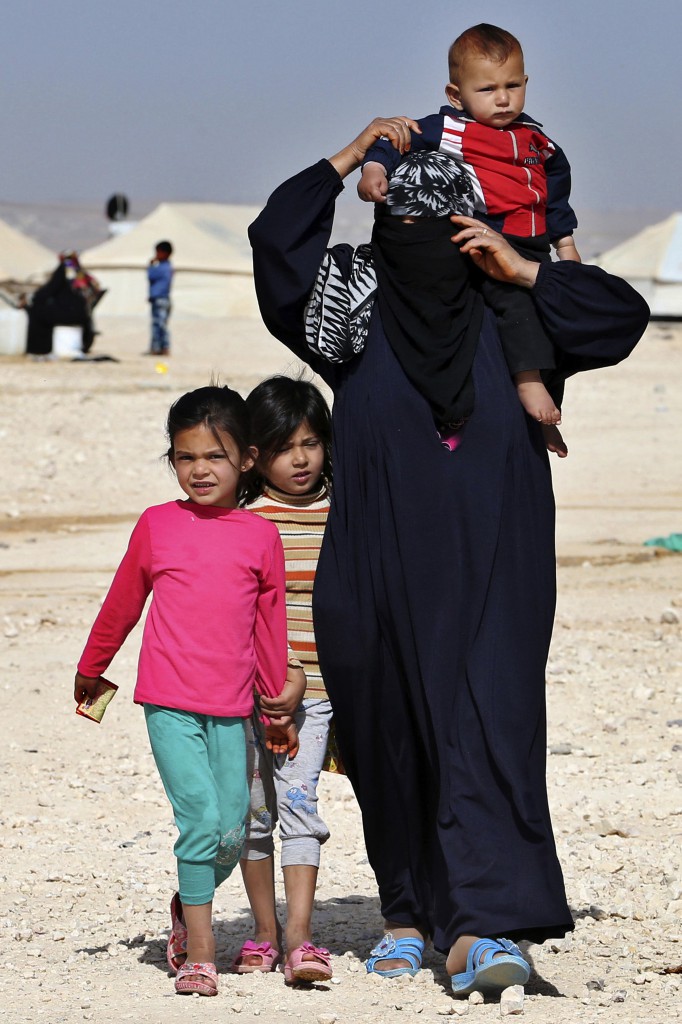
AMMAN, Jordan (CNS) — Fleeing conflict and violence back home, refugees from Syria and Iraq praised the Catholic humanitarian agencies helping them to cope with their trauma while starting a new life in their adopted safe haven of Jordan.
“We’ve come out of a nightmarish and desperate time. We’re trying to regain some semblance of normalcy in life,” said Um Ahmed, a Syrian refugee woman attending a life skills class run by the Jesuit Refugee Service in the Jordanian capital.
The Roman Catholic Bishops’ School perched on one of Amman’s high hills buzzes with classes of refugees learning English, Arabic literacy, computer skills, handicrafts and cooking conducted after regular classes conclude.
Living became impossible in Ahmed’s northern Syrian city of Aleppo because of constant fighting and government bombardments. “My family was also extremely afraid because people were being detained and had disappeared. We feared for our lives,” she told Catholic News Service May 5.
“Leaving everything, our work and possessions behind, we had to start from scratch again here,” Ahmed said.

Ahmed is among than 600 refugees who are slowly getting back on their feet through JRS-sponsored programs that include home visits, psychosocial support, educational opportunities for children and adults and college degree preparation. The organization also provides food parcels and hygiene kits.
“We serve not only Syrian and Iraqi refugees, but also Somali and Sudanese refugees, who have been marginalized and forgotten here in Jordan by other NGOs,” explained Tamim Arif, the agency’s acting country director.
Arif said the majority of the students are women.
“This is really good because in Arab culture women rarely leave the house. Our classes provide a safe place for them to share their experiences and to learn,” he said.
An Iraqi woman, Um Mustafa, said she and her family fled Iraq more than a year ago after receiving threats and her brother-in-law was killed in Baghdad.
“By going to the JRS school, I’m not only learning new skills. I have the chance to meet other women and develop friendships,” Mustafa said.
“It’s difficult to leave your homeland. You feel isolated in a foreign place, but here I don’t feel alone anymore,” she added. “The people are good and kind. I feel like I have a second family.”
Jordan has become the main refuge for people fleeing conflicts in the Middle East. About half of its nearly 7 million inhabitants are Palestinians who fled several wars with Israel and their descendants.
Today, 300,000 Iraqi refugees and more than 600,000 Syrian refugees registered with the United Nations High Commissioner for Refugees are straining Jordan’s meager financial resources and its educational, health and energy sectors. The government has reported that more than 1 million Syrians are sheltering in Jordan and their numbers are growing daily.
Jordan also hosts the world’s second largest U.N. refugee camp at Zaatari. The U.N. has opened another facility that could eventually house up to 130,000 Syrian refugees as the violent three-year-old conflict shows no signs of ending.
“Every time the Catholic Church opens a cultural or medical institution, it is there for everybody, not just for Christians,” said Father Rifat Bader, who directs the Catholic Center for Studies and Media in Amman.
“The international Catholic health charity, Caritas, is helping more than 100,000 Syrians every day in Jordan as they have also supported Iraqi refugees,” Father Bader said. “It’s not only to give them food or medical assistance, but to show them care and compassion that they are still human beings.”
The Catholic Near East Welfare Association also supports a variety of ministries to refugees in Jordan, explained Cardinal Timothy M. Dolan of New York, the agency’s chairman, who recently visit Jordan to witness the organization’s work.
In addition, the Mother of Mercy clinic in the industrial town of Zarqa, just outside of Amman, run by the Dominican Sisters of St. Catherine of Siena, provides prenatal and neonatal care to poor women and children, almost all of whom are Palestinian refugees and their descendants.
Meanwhile, the Sisters of Franciscan Missionaries of Immaculate Heart of Mary have opened their convent for Syrian and Iraqi refugee families to gather in the afternoon, Cardinal Dolan told CNS.
“It was extraordinarily moving to see these children come after school for catechism, play, skit and song, while their parents join in the camaraderie,” he said. “The sisters are already respected on the ground for their work and they are doing this as the natural outgrowth of their ministry.”
Arif of JRS said his agency also is trying to reach refugee children who are unable to attend school in Jordan.
“Some Syrians cannot walk to faraway schools and cannot afford the transportation to get there,” he said. “Other schools are overwhelmed by the numbers and cannot take them in.”
Refugee children who have missed out on years of education because of the conflicts are behind and need additional tutoring, while others are bullied or discriminated against by other students, he said.
A lack of classroom space hinders JRS from offering education to more students and JRS has called on more Jordanian parishes to open up their school premises.
“We need facilities so we can accept all of those overwhelming numbers,” he said. We have many children who are not in school now. This is creating another lost generation.”
— By Dale Gavlak, Catholic News Service





